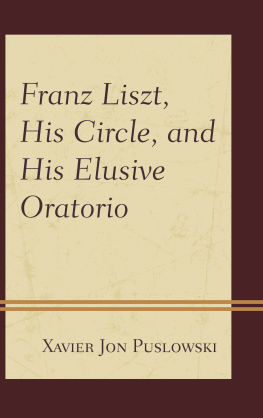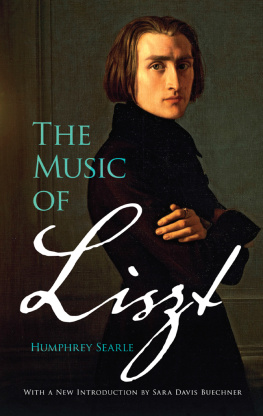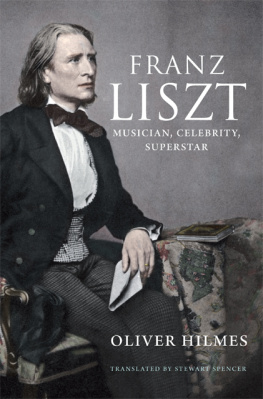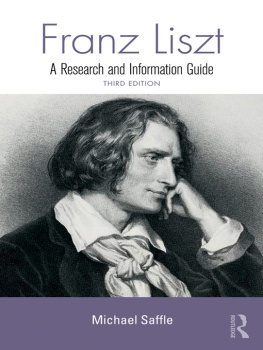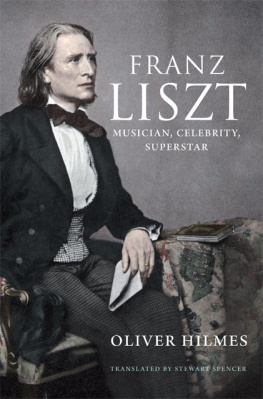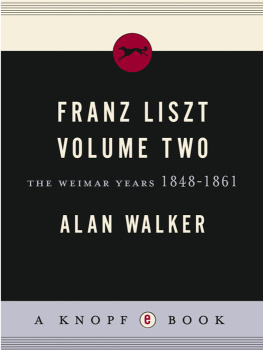Hall-Swadley Janita R - The Collected Writings of Franz Liszt, Vol.1
Here you can read online Hall-Swadley Janita R - The Collected Writings of Franz Liszt, Vol.1 full text of the book (entire story) in english for free. Download pdf and epub, get meaning, cover and reviews about this ebook. year: 2011, publisher: Scarecrow Press, genre: Detective and thriller. Description of the work, (preface) as well as reviews are available. Best literature library LitArk.com created for fans of good reading and offers a wide selection of genres:
Romance novel
Science fiction
Adventure
Detective
Science
History
Home and family
Prose
Art
Politics
Computer
Non-fiction
Religion
Business
Children
Humor
Choose a favorite category and find really read worthwhile books. Enjoy immersion in the world of imagination, feel the emotions of the characters or learn something new for yourself, make an fascinating discovery.

- Book:The Collected Writings of Franz Liszt, Vol.1
- Author:
- Publisher:Scarecrow Press
- Genre:
- Year:2011
- Rating:5 / 5
- Favourites:Add to favourites
- Your mark:
- 100
- 1
- 2
- 3
- 4
- 5
The Collected Writings of Franz Liszt, Vol.1: summary, description and annotation
We offer to read an annotation, description, summary or preface (depends on what the author of the book "The Collected Writings of Franz Liszt, Vol.1" wrote himself). If you haven't found the necessary information about the book — write in the comments, we will try to find it.
The Collected Writings of Franz Liszt, Vol.1 — read online for free the complete book (whole text) full work
Below is the text of the book, divided by pages. System saving the place of the last page read, allows you to conveniently read the book "The Collected Writings of Franz Liszt, Vol.1" online for free, without having to search again every time where you left off. Put a bookmark, and you can go to the page where you finished reading at any time.
Font size:
Interval:
Bookmark:
F. Chopin
Edited and Translated by
Janita R. Hall-Swadley

Published by Scarecrow Press, Inc.
A wholly owned subsidiary of The Rowman & Littlefield Publishing Group, Inc.
4501 Forbes Boulevard, Suite 200, Lanham, Maryland 20706
http://www.scarecrowpress.com
Estover Road, Plymouth PL6 7PY, United Kingdom
Copyright 2011 by Janita R. Hall-Swadley
All rights reserved. No part of this book may be reproduced in any form or by any electronic or mechanical means, including information storage and retrieval systems, without written permission from the publisher, except by a reviewer who may quote passages in a review.
British Library Cataloguing in Publication Information Available
Library of Congress Cataloging-in-Publication Data
Liszt, Franz, 18111886.
[Literary works. English]
The collected writings of Franz Liszt / edited and translated by Janita R. Hall-Swadley.
p. cm.
Includes bibliographical references and index.
ISBN 978-0-8108-8101-3 (cloth : alk. paper)
1. Music. 2. Chopin, Frdric, 18101849. I. Hall-Swadley, Janita R., 1963 II. Title.
ML410.L7A113 2011
780dc22
2011003030
 The paper used in this publication meets the minimum requirements of American National Standard for Information SciencesPermanence of Paper for Printed Library Materials, ANSI/NISO Z39.48-1992. Printed in the United States of America
The paper used in this publication meets the minimum requirements of American National Standard for Information SciencesPermanence of Paper for Printed Library Materials, ANSI/NISO Z39.48-1992. Printed in the United States of America
To
Alan Walker and Michael Saffle
Without your help, this project could not have been completed.
I thank you
by Jolanta T. Pekacz
Jolanta T. Pekacz
Franz Liszts F. Chopin occupies an ambiguous place in the vast literature on Frederick Chopin. On the one hand, it is recognized as a unique work written by a fellow musician of comparable stature, containing valuable observations about Chopins music and his personality, and historically the first biographical work on Chopin. On the other hand, however, it began attracting criticism even before it was published, and its lambasting has continued until this day. A detailed questionnaire which Liszt sent to Chopins sister Ludwika Jdrzejewicz on 14 November 1849, just two weeks after Chopins funeral, turned out to be a bone of contention. Ludwika likely considered the questionnaire insensitive, especially the questions regarding her brothers relationship with George Sand, and handed it over to Chopins Scottish pupil and friend Jane Stirling, who answered some of its questions, albeit incompletely and cautiously, and evaded others. There is no evidence that Liszt used Stirlings answers. His sources consisted of his personal recollections, other peoples memoirs, anecdotes without a clear provenance, and the current opinions, perceptions, and stereotypes about Poland and the Poles. It is widely agreed that a manuscript produced within a short time was the result of literary cooperation between Liszt and his companion at the time, Princess Carolyne Sayn-Wittgenstein, an aristocrat of Polish origin. Uncertain of its quality, Liszt sent the manuscript for assessment, first to his friend, the music writer Joseph dOrtigue (who apparently offered an overall positive opinion), and then to the prominent literary critic Charles-Augustin Sainte-Beuve (who advised a complete rewriting but refused to get involved in the project). Liszt was not discouraged by Sainte-Beuves thinly disguised criticism, nor did he undertake a thorough rewriting as far as scholars can tell. When the biography appeared in Paris, first in installments in La France musicale in 1851 and then in book form in 1852, it was received with mixed feelings. Critics noted its factual errors, verbosity, and bombastic prose. Chopins family was offended with Liszts inaccurate statement that young Fredericks education was financed by Prince Antoni Radziwi. Jane Stirling was more outraged with what Liszt had left out about Chopin as a musician than impressed with what he had included. Others were disappointed that the first biography of Chopin was not written by one of his Polish friends: Wojciech Grzymaa or Julian Fontana. Fontana admitted that Liszts work discouraged him from writing his own study on Chopin because Liszts international stature made him more credible in the publics eyes, and the image of Chopin he had created would be very difficult to change. Polish music writer Marceli Antoni Szulc noticed insightful passages about Chopins music and believed that Liszts book might be of some interest to foreign readers but found it useless to Poles. George Sand considered Liszts book a little exuberant in style but filled with good things and very beautiful pages. Liszts biography fared better in the United States, where the first complete translation appeared in 1863 and was warmly received by the musical press.
An expanded edition of Liszts biography, published in France in 1879, triggered further criticism, as the additions consisted largely of lengthy ruminations about Polish national traits and pseudo-philosophical musings, attributed to Princess Sayn-Wittgenstein. It was this edition that La Mara (Marie Lipsius) used as the basis of her German translation, which appeared in 1880 as part of Liszts Gesammelte Schriften. La Mara further obscured the French original of F. Chopin by arbitrarily paraphrasing, cutting, and transposing some sections of the work. Peter Gast (pseud. for Heinrich Koselitz), Friedrich Nietzsches friend and assistant, wrote to Nietzsche on 8 August 1880 that although Liszts biography gave him fragmentary ideas about the impression Chopins works made on his contemporaries, it was also an example of how one should not write about such a man [as Chopin]. Unless one wanted to put [the reader] in a rage because Liszts way of writing does not uphold the artists fame; to achieve this goal, another type of evidence is needed, not distorted historical facts. Neither Nietzsche nor Gast was enthusiastic about Liszt as a composer, but perhaps it was not Liszt alone who should be blamed for the shortcomings of Chopins biography. In more recent times, Adam Karasowski, in his debunking of the legends surrounding Chopins life, pointed out numerous factual errors of Liszts biography, called it a torrent of verbosity, and attributed all its faults to Princess Sayn-Wittgenstein: her shallow display of erudition and the lack of mental discipline. Only one-tenth of the biography was Liszts own, according to Karasowski. In contrast, Polish musicologist Adolf Chybiski, emphasized the value of Liszts remarks on Chopins music and the ambiguity of factual knowledge and its irrelevance for ones understanding of a creative process. Thus, the reception of Liszts F. Chopin appears to have oscillated between two poles: while Liszt is typically chastised for inaccuracies in his account of Chopins life, he is also prized for his commentary on Chopins music.
While there is no doubt that Liszts F. Chopin is not a repository of irrefutable facts, it is not what the reader should be looking for in Liszts book. And there is no reason to deny F. Chopin the status of a biography as, for example, Frederick Niecks did in the Preface to his own biography of Chopin, published in 1888. Nor is there any reason to discard the biographical component of F. Chopin as valueless. With the claims to veracity and objectivity of the traditional biography being questioned, Liszts
Font size:
Interval:
Bookmark:
Similar books «The Collected Writings of Franz Liszt, Vol.1»
Look at similar books to The Collected Writings of Franz Liszt, Vol.1. We have selected literature similar in name and meaning in the hope of providing readers with more options to find new, interesting, not yet read works.
Discussion, reviews of the book The Collected Writings of Franz Liszt, Vol.1 and just readers' own opinions. Leave your comments, write what you think about the work, its meaning or the main characters. Specify what exactly you liked and what you didn't like, and why you think so.

